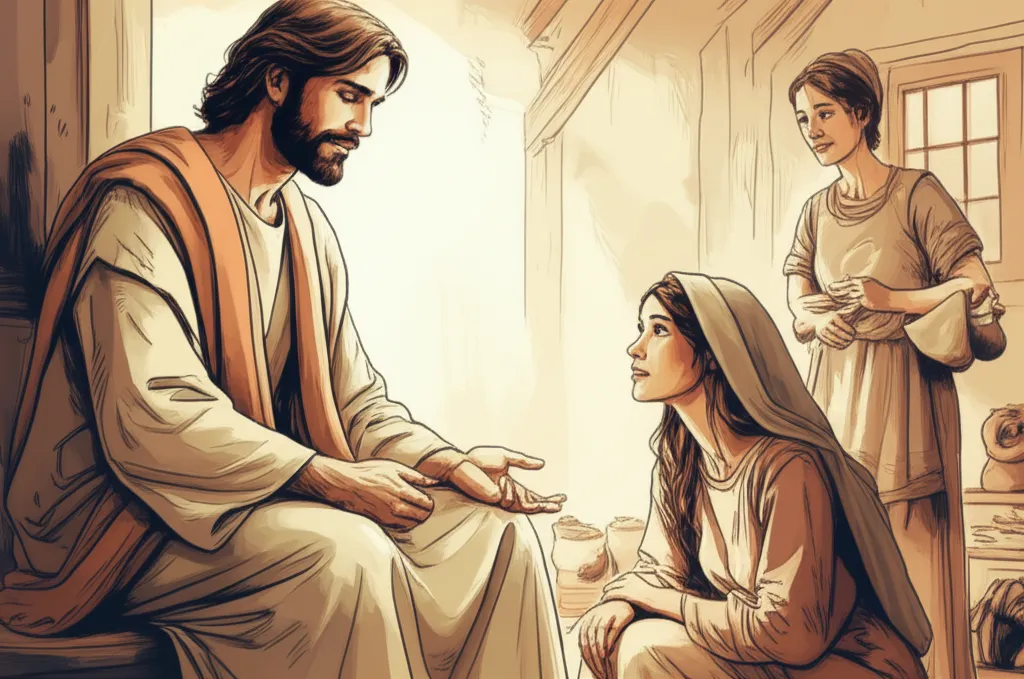Today, as we commemorate Saints Martha, Mary, and Lazarus, we find ourselves drawn into the heart of what it means to encounter Christ in our daily lives. These siblings, each with their unique approach to faith, offer us a profound lesson in balancing action and contemplation, service and devotion. Their story, woven through the Gospels, reminds us that our relationship with God is multifaceted, demanding both our active participation and our quiet attentiveness.
The Tent of Meeting and Our Personal Encounter with God
In the first reading from Exodus (33:7-11; 34:5b-9, 28), we see Moses setting up the tent of meeting outside the camp, a place where anyone who wished to consult the Lord could go. This tent symbolizes a space set apart for direct communication with God. The Lord spoke to Moses "face to face, as one man speaks to another." This image invites us to consider: Where is our "tent of meeting"? Where do we go to seek that intimate, personal encounter with God?
In our busy, modern lives, it's easy to let the noise of the world drown out the still, small voice of God. We are constantly bombarded with information, demands, and distractions. Yet, like Moses, we must intentionally create space for God, a sanctuary where we can lay bare our hearts and listen for His guidance. This might be in the quiet of our morning prayers, during a walk in nature, or in the stillness of Eucharistic Adoration. The key is to seek that face-to-face encounter, to cultivate a relationship where we can hear God speaking directly to our souls.
Martha, Mary, and the Balance of Action and Contemplation
The Gospel reading (Luke 10:38-42) presents us with the familiar scene of Martha and Mary welcoming Jesus into their home. Martha, busy with the practicalities of hospitality, becomes frustrated that Mary is simply sitting at Jesus' feet, listening to Him speak. "Lord, do you not care that my sister has left me by myself to do the serving? Tell her to help me." Jesus' response is gentle but firm: "Martha, Martha, you are anxious and worried about many things. There is need of only one thing. Mary has chosen the better part, and it will not be taken from her."
This passage is not a condemnation of service or action. Rather, it highlights the importance of balance. We are called to be both Marthas and Marys, to engage in the world with love and service, but also to cultivate a deep, contemplative relationship with Christ. As one of the early Church leaders wisely noted, love and good works are essential, but they must flow from a heart that is rooted in prayer and contemplation.
Think of it this way: if we are constantly pouring out without being filled, we will eventually run dry. Mary understood this. She recognized that sitting at Jesus' feet, listening to His words, was not a passive act, but a vital source of nourishment for her soul. It was from this place of deep connection that she could then go out and serve with genuine love and compassion.
"I Am the Resurrection and the Life"
In the alternative Gospel reading (John 11:19-27), we encounter Martha again, this time in the midst of grief over the death of her brother, Lazarus. When Jesus arrives, Martha expresses her faith, but also her sorrow: "Lord, if you had been here, my brother would not have died." Jesus responds with a profound declaration: "I am the resurrection and the life; whoever believes in me, even if he dies, will live, and everyone who lives and believes in me will never die. Do you believe this?"
Martha's response is a powerful affirmation of faith: "Yes, Lord. I have come to believe that you are the Christ, the Son of God, the one who is coming into the world." In this moment, Martha transcends her grief and embraces the hope of eternal life.
This passage speaks directly to our own fears and anxieties about death. We live in a world that often denies or avoids the reality of death, but as Christians, we are called to face it with hope and courage. Jesus' words offer us the ultimate assurance: that death is not the end, but a transition to eternal life with Him. This is not merely wishful thinking, but a truth grounded in the very nature of God. As one of the great theologians of the Church articulated, faith and reason are both gifts from God, and they can lead us to truth. While human reason can help us understand the natural world, divine revelation is necessary for truths beyond our grasp, such as the promise of resurrection.
Saints Martha, Mary, and Lazarus: Witnesses to Hope
The lives of Saints Martha, Mary, and Lazarus offer us a powerful example of faith in action. They welcomed Jesus into their home, listened to His teachings, and witnessed His power and love. They experienced both the joys and sorrows of life, but through it all, they remained steadfast in their belief.
Today, let us ask for their intercession, that we may have the grace to balance action and contemplation, service and devotion, in our own lives. May we, like Martha, be willing to serve with love and generosity. May we, like Mary, be attentive to the voice of God in our hearts. And may we, like Lazarus, be raised to new life in Christ, both now and for eternity.
